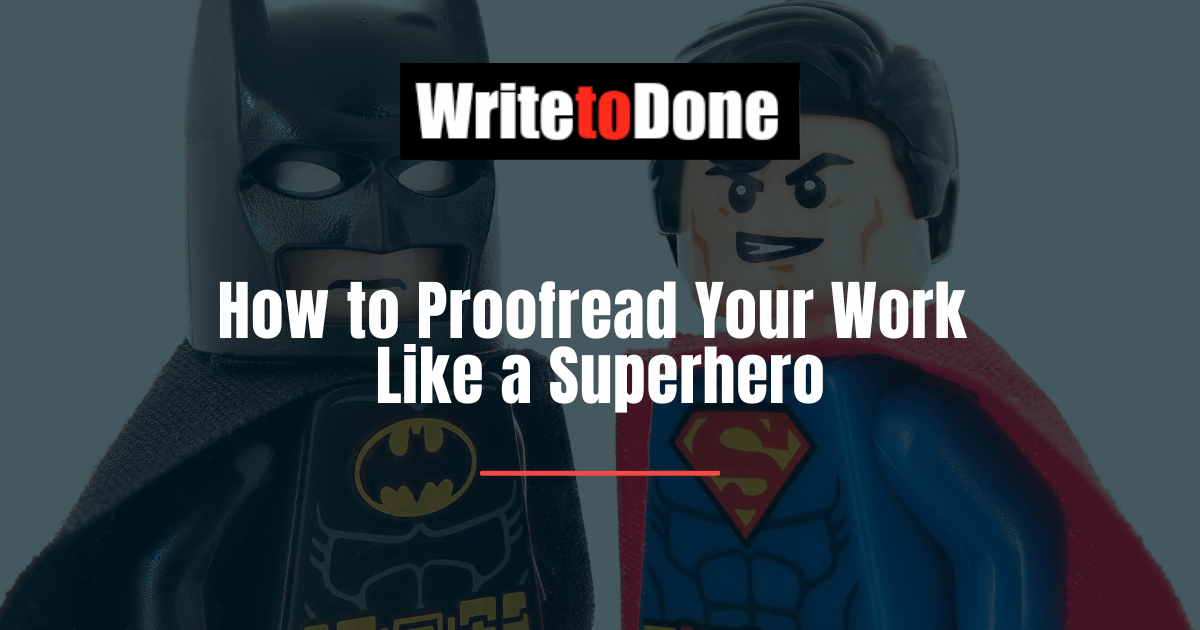Everyone wants to be Batman.
He’s cool and edgy, but has benevolent intentions—and the man gets results.
Luckily for you, it’s easy to adopt Batman’s intriguing qualities to perfect your writing and make others believe that you rock as hard as the Caped Crusader.
Whether you’re writing for yourself (a blog, a novel, a business document, etc.) or a client, mistakes aren’t going to cut it. Your text has to be poignant, useful, and error-free.
Here are three aspects of the Batman persona that you can apply to your proofreading habits.
Costume – The importance of writing drafts
When speaking in front of an audience, it is said that the crowd forms 70% of their opinions on how you look, 20% on how you sound, and only 10% on what you say. When you apply the theory to written text, the 70% of “how you look” reflects the content and structure of your writing.
How your writing “looks” involves its appeal to the reader, and proofreading enhances appeal. Text that a writer initially believes to be straightforward may actually be vague, unclear, or forgettable.
While the design of your document can certainly play a role in your visual presentation, you perfect your composition’s “look” by not only fixing typos, spelling, grammar, and punctuation mistakes, but also checking for consistency, clarity, and cohesiveness (among other factors, which may or may not be words that begin with the letter “c”). Readers are more receptive to your ideas when they can easily comprehend your writing. A document full of blemishes will not hold the reader’s interest.
You often know what you want to say, but your concept is not always translated to the reader. It’s essential to review your document as if you were not the person who wrote it. If you casually proofread your own text, you may skip reading every word in a sentence, but it will likely still make sense—it won’t necessarily to someone else.
Schedule an editing session after you take a break from writing. Spending time away from your ideas and the words on the page helps you decipher how can you improve the quality of your work.
No one gets it right on the first try. Take advantage of drafts.
Writing is as much a process as drawing, painting, or sculpting. A project needs to be carefully crafted. Each step contributes to the next action, whether it’s cleaning your paintbrushes, sketching a mock-up of your vision, or writing the seedlings of your ideas down in a rough draft.
Each draft is a costume. Batman had to experiment with different versions of the “bat suit” until it was the ideal combination of aesthetics and functionality—an outfit that communicates that you don’t want to mess with Batman.
Change costumes by proofreading until you get it right. When complete, you’ll have a suit that tells a powerful story.
Gadgets – When to use resources to improve your weaknesses
Crime fighting is Batman’s goal. Communicating a clear message is yours. Stay as focused on your goal as Batman by genuinely connecting with your audience. Work with what you know, and do the appropriate research when you discuss unfamiliar topics.
Seems impossible to swiftly travel from the ground to the top of a tall building? Didn’t stop Batman. He uses resources to overcome obstacles, invent complementary gadgets, and enhance his ability to stifle bad guys.
If you forgot a punctuation rule, look it up. If a sentence is incomplete, elaborate. If a paragraph is convoluted, simplify. Thorough proofreading examines each word and kicks it to the curb if it can be replaced with a more effective option.
Don’t take any aspect of your text for granted. Everyone knows that grammar mistakes make your writing look sloppy, but fixing them isn’t always a writer’s priority.
It reminds me of a Chinese story about the monk, Birdsnest, who lived in a tree and gave the most profound advice in China. When the governor of the land visited Birdsnest, the guidance that the monk told the officer was simple, “Don’t do bad things. Always do good things.”
Feeling cheated by this obvious statement, the governor exclaimed, “I knew that when I was three years old!”
“Ah, yes,” Birdsnest replied. “The three-year-old knows it, but the eighty-year-old still finds it difficult to do.”
Tone – The benefits of writing and editing with confidence
The sound of Bruce Wayne’s voice changes when he becomes Batman. The deeper, firm tone of the winged vigilante is not a frivolous characteristic; it is an intentional display of confidence.
Batman doesn’t worry about pleasing everyone. Unapologetically write from your point of view, but don’t be sloppy or careless.
After writing a draft, confidently make changes to weak sections. To proofread meticulously, you don’t merely spot glaring errors, you recognize the message that the text intends to convey and ensure that each word in the document contributes to that purpose.
Batman doesn’t ask for permission; he’s in a class of his own.
No matter what you do, be Batman. It’s about doing what no one else does.
It wasn’t a radioactive spider bite, non-Earthling birth status, or mutated genetics that bestowed Bruce Wayne with the talent to be a superhero. He’s a guy that decided to kick ass no matter what.
Batman reminds us:
Don’t quit your night job.
Bruce Wayne may be a necessary part of life, but listen to your Batman-calling to be something extraordinary.
















